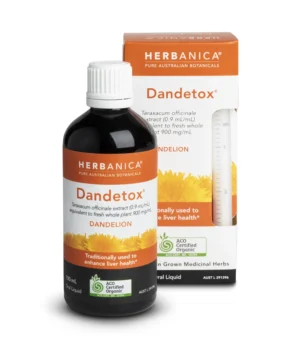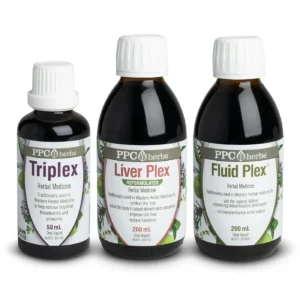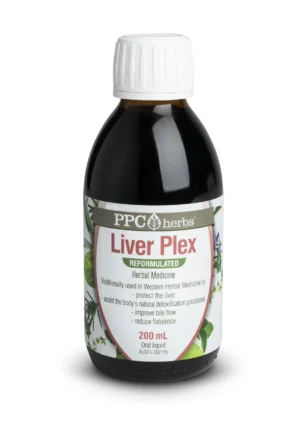Having good liver health is vital for overall well-being. Luckily, a number of lifestyle choices can help us to protect our liver so that it functions optimally for the duration of our lives. In addition, nature provides us with a range of helpful herbs known to provide the liver with added support as it performs its essential functions.
Liver herbs have been used for centuries by different cultures to treat issues with the liver. These plants contain amazing properties that can support our bodies’ natural detoxification processes and contribute to good liver health. PPC’s Liver Plex herbal medicine includes a range of liver-supporting herbs in an easy-to-ingest form. Our Liver Plex formulation has no added sugars, and is made here in Australia. It’s also gluten-free and vegan-friendly.
How Liver Plex herbal medicine can support liver health
PPC Herbs’ Liver Plex herbal medicine is a great support for liver health. The herbs included in Liver Plex have traditionally been used in Western Herbal Medicine to protect the liver and assist the body’s natural detoxification processes.
Liver Plex combines extracts of St Mary’s Thistle seed, Dandelion root, Turmeric root, and Globe Artichoke leaf.
Haven’t heard of these ingredients? Here’s some information on how they can help support healthy immune function.
St Mary’s Thistle Seed (Silybum marianum) – 1.5mL, equiv. dry 1.5g
- Benefit: Known for its liver-protective properties, St Mary’s Thistle (Milk Thistle) is thought to regenerate liver cells and shield the liver from toxins and oxidative stress. It’s often used to support liver function in cases of liver damage or disease.
Dandelion Root (Taraxacum officinale) – 750 microlitres, equiv. dry 750mg
- Benefit: Dandelion root is understood to stimulate the production of bile. This aids in the breakdown of fats and in digestion. Dandelion also supports the key detoxification processes in the liver, and therefore helps it to clear waste.
Turmeric Root (Curcuma longa) – 500 microlitres, equiv. dry 500mg
- Benefit: Turmeric has potent anti-inflammatory and antioxidant effects that can help reduce liver inflammation and protect liver cells from damage caused by toxins and oxidative stress.
Globe Artichoke Leaf (Cynara scolymus) – 134 microlitres, equiv. dry 67mg
- Benefit: Globe artichoke leaf enhances bile production and flow, improving digestion and fat metabolism. It also helps detoxify the liver and supports the regeneration of liver tissue.
Dandetox® (Dandelion) to support the liver
Dandelion has long been used as a liver tonic. It promotes the flow of bile from the liver and gallbladder, which supports the liver’s natural cleansing/detoxification processes.
Dandetox® (Dandelion) contains Taraxacum officinale (common dandelion) extract (0.9 mL/mL) equivalent to fresh whole plant 900 mg/mL.
All dandelion used in Dandetox ® are Australian-grown.
PPC’s herbal medicine for liver support
Taking Liver Plex herbal medicine is a simple and effective way to support your liver and help it to function at its best.
PPC’s Liver Plex is made in Australia and uses genuine botanical materials. Liver Plex is:
- Free of caffeine, preservatives, artificial colouring, and added sugars.
- Gluten free
- Easily ingestible (you can dilute Liver Plex with juice, water or other fluids.)

What to consider when taking medicine to support the liver:
- Remember—herbal medicine alone will not be the ultimate solution to a stressed or damaged liver. Lifestyle changes and prescribed treatments from your GP may be required.
- Research your medicine and the ingredients it contains. Look out for reputable manufacturers, and for Australian-made products that meet local manufacturing standards.
- Don’t take more than the dosage recommended on the label.
- Stick to the recommended duration of use when taking herbal medicine. (Whilst there’s no restriction on long term use of PPC’s Liver Plex and Dandetox ® herbal medicines, it’s still worth noting down when you commenced taking them, and if your symptoms continue to persist, see your GP.)
- Herbal medicines should not be used as treatments for serious conditions like tuberculosis, leukosis, collagenosis, AIDS, HIV infection, multiple sclerosis and certain other autoimmune disorders. If in any doubt, consult with your physician.
- Patients with gallstones, obstructed bile ducts, gallbladder empyema or obstructive ileus, should talk to a physician before using the herbal medicine.
- Consult your healthcare professional before taking any herbal medicines if you are pregnant or are breastfeeding, if you have an autoimmune disease, or if you are taking immunosuppressant medication.
- Stop taking herbal medicine if you experience any adverse reactions.
- Avoid herbal medicines that contain ingredients you have a known allergy to.
- Be wary of combining different medicines, whether they be herbal medicines or otherwise—you may exceed the recommended dose of individual ingredients. To be safe, consult with your healthcare professional before taking more than one medicine or supplement at a time.
More about the liver
The Liver’s Essential Functions
The liver is one of the largest organs in the body with the average liver weighing 1800 g in men and 1400 g in women. This amazing organ operates 24/7 and fulfils a range of functions essential to our good health. The liver:
Processes toxins: Whether it be chemicals we consume through our diet, alcohol, medicinal drugs, or environmental toxins we absorb through the skin or breathe into our airways, we need a way to process these toxins, and that’s where the liver steps in. The liver works hard to break down poisons and helps flush them out of our system.
Cleanses the blood: The liver performs the important job of removing a substance called bilirubin from the body. As our red blood cells age, bilirubin, (an orange-yellow pigment), is released from those destroyed blood cells. The liver then processes bilirubin, and releases it in the form of bile. If your liver isn’t functioning well, it won’t be able to process and release bilirubin, and there’ll be a build up in the body. (High bilirubin levels will appear in a liver function test.)
Produces bile for digestion: The liver creates bile, stored in the gallbladder, which performs the important function of helping to break down fats in the small intestine during digestion.
Produces essential proteins. We require a range of proteins to help fight off infection, clot the blood and move substances around our bodies. Many of these essential proteins are created by our liver, so the better our liver health, the better the flow-on effects.
Maintains hormone balance: The liver regulates various hormones, including thyroid hormones, sex hormones, cortisone, and other hormones essential for the effective function of the metabolism. Poor liver function will impact its ability to create these hormones, leading to imbalances.
Regulates our energy supply: The liver produces, stores, and releases glucose for quick energy, while also generating, storing, and distributing fat.
Manages cholesterol levels: The liver not only produces cholesterol, but it helps to eliminate excess cholesterol, converting it into other necessary compounds.
Stores minerals and vitamins: The liver holds onto important nutrients that are essential for our bodies, like iron, copper, and vitamins A, D, K, and B12.
What can damage the liver?
A range of things can damage the liver. These include certain viruses, medications, environmental toxins, alcohol, a poor diet consisting of highly-processed foods and excessive sugar, lack of exercise and obesity, and actual physical injury to the liver.
Types of liver damage
Fibrosis and cirrhosis. A healthy liver should be smooth and soft, however if the liver is damaged, it can become scarred. This is called fibrosis. Fibrosis usually occurs over a process of years, however once the entire liver succumbs to fibrosis scarring, the liver shrinks and becomes lumpy and hard. This is called cirrhosis.
Once there’s cirrhosis of the liver, many of the liver’s essential operations are hindered, which can then lead to ripple effects on other organs and our overall health.
Fatty liver disease. Fatty liver disease occurs when more than 5 to 10% of the total weight of the liver is made up of fat. When there’s too much fat in the liver, it functions poorly.
The two main forms of fatty liver disease are:
- Alcohol-related fatty liver disease: Alcohol places a lot of stress on the liver. Drinking more than 10 standard drinks each week, or binge drinking more than 4 standard drinks in a day, puts you at greater risk of alcohol-related fatty liver disease.
- Metabolic Associated Fatty Liver Disease (MAFLD): People with type 2 diabetes, obesity, high blood pressure and high cholesterol are at greater risk of fatty liver disease. The biggest risk factor for obesity that leads to fatty liver is having a diet high in sugars, saturated fats and processed foods.
Other issues may play a role in causing fatty liver disease, such as polycystic ovary syndrome (PCOS), an underactive thyroid, or reactions to certain medicines. (Often, a number of different causes combine to cause the disease.)
Hepatitis. Hepatitis A, Hepatitis B, and Hepatitis C result from infections of the liver caused by viruses. Autoimmune Hepatitis is the body’s own immune system causing inflammation and damage to the liver. (Vaccines exist for Hepatitis A and Hepatitis B.)
Liver cancer (Hepatocellular carcinoma or HCC) originates in liver cells called hepatocytes and gradually forms liver tumours. This cancer eventually spreads to other body parts. Early detection and treatment can greatly improve outcomes.
Liver injury. This is usually caused by some kind of blunt force trauma to the liver, such as in a road accident.
Signs of liver stress or damage – what to look out for
There’s a long list of symptoms of a poorly functioning liver, or indeed, liver disease. Key signs include:
- Jaundice (yellowing of the skin and eyes) due to excess bilirubin.
- Fatigue and weakness.
- Abdominal pain or swelling, especially in the upper right side.
- Dark urine and black or pale stools.
- Unexplained weight loss or loss of appetite.
- Nausea and vomiting.
- Swelling in the legs, feet or ankles (edema).
- Itchy skin without a clear cause.
- Easy bruising or bleeding due to reduced clotting factors.
- Confusion, drowsiness or memory problems (hepatic encephalopathy) in severe cases.
Additional signs of a struggling liver may include a bloated tummy, loss of appetite, hair loss, anaemia and poor sleep. For a comprehensive list of signs and symptoms, and information on when to seek urgent medical attention for your liver, see the Liver Foundation’s Symptoms list.
Testing your liver
If you have any concerns about your liver due to your lifestyle, or are experiencing symptoms of poor liver function, you can ask your doctor for a Liver Function Test (LFT). The LFT is a blood test that measures a range of proteins, enzymes and bilirubin in your blood to check for elevated or abnormal levels that may indicate inflammation or impaired liver function, liver damage or disease. The liver function test also includes a check for cirrhosis, different forms of hepatitis, and fatty liver disease.
Based on the results of the test, a GP may recommend lifestyle changes and/or medications to support the recovery of your liver, or treat a damaged or diseased liver. In some cases, other interventions may be required.
Lifestyle measures to support your liver
A range of lifestyle measures can be taken to support the healthy functioning of your liver, and to help recover from liver damage. Changes you can make include:
Exercise. Exercise reduces the risk of chronic diseases like type 2 diabetes and heart disease, and is a key treatment for fatty liver disease, as it aids in weight loss and helps prevent muscle wasting caused by advanced liver conditions. It’s also a great mood booster and helps relieve stress!
Australian guidelines recommend adults engage in 2 ½ to 5 hours of moderate-intensity activity or 1 ¼ to 2 ½ hours of vigorous-intensity exercise weekly, along with muscle-strengthening exercises twice a week (think squats and lunges, push ups / pull ups, weight lifting and household tasks like digging, lifting and carrying).
Avoid alcohol: Alcohol damages the liver through oxidative stress and inflammation. Liver damage can occur suddenly, from binge drinking, or gradually over time with heavy drinking. Alcohol consumption increases the risk of serious liver problems, especially for those with pre-existing liver disease, and can also contribute to weight gain, nutrient deficiencies, and liver cell damage.
The Australian Government recommends limiting alcohol intake to no more than 10 standard drinks per week and no more than 4 in one day, with zero alcohol for children, pregnant, or breastfeeding women.
Avoid industrial chemicals. Exposure to certain chemicals in the workplace or at home can lead to liver damage. Common harmful substances include the dry-cleaning solvent carbon tetrachloride, vinyl chloride (used in plastic production), the herbicide paraquat, and a class of industrial compounds known as polychlorinated biphenyls. If possible, avoid exposure to industrial chemicals, and if you can’t avoid them when working, ensure you use proper personal protective equipment, including gloves, respirators and so on.
Hydration. Water is essential for detoxifying the liver. If you don’t drink enough, the body has a hard time eliminating the toxins from your body. 6-8 cups or glasses a day is recommended.
Healthy Diet: Diets high in saturated fat, sugar and alcohol can lead to a buildup of fat in the liver, and fat impairs the liver’s ability to perform required functions.
For optimal liver health, limit processed foods, sugary snacks and drinks, and alcohol. Instead, focus on consuming fruits, vegetables, legumes, whole grains and healthy fats like olive oil. It’s also recommended that you steam or bake food, rather than boil or fry, to preserve nutrients.


